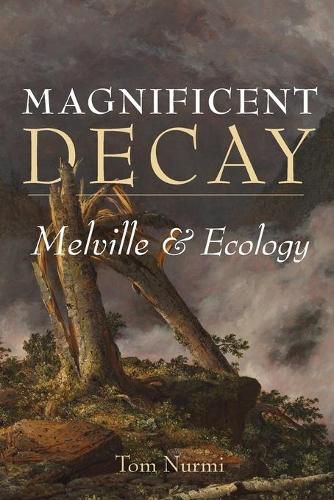Readings Newsletter
Become a Readings Member to make your shopping experience even easier.
Sign in or sign up for free!
You’re not far away from qualifying for FREE standard shipping within Australia
You’ve qualified for FREE standard shipping within Australia
The cart is loading…






This title is printed to order. This book may have been self-published. If so, we cannot guarantee the quality of the content. In the main most books will have gone through the editing process however some may not. We therefore suggest that you be aware of this before ordering this book. If in doubt check either the author or publisher’s details as we are unable to accept any returns unless they are faulty. Please contact us if you have any questions.
What is Melville beyond the whale? Long celebrated for his stories of the sea, Melville was also fascinated by the interrelations between living species and planetary systems, a perspective informing his work in ways we now term ecological . By reading Melville in the context of nineteenth-century science, Tom Nurmi contends that he may best be understood as a proto-ecologist who innovatively engages with the entanglement of human and nonhuman realms. Melville lived during a period in which the process of scientific specialization was well underway, while the integration of science and art was concurrently being addressed by American writers. Steeped in the work of Lyell, Darwin, and other scientific pioneers, he composed stories and verse that made the complexity of geological, botanical, and zoological networks visible to a broad spectrum of readers, ironically in the most unscientific forms of fiction and poetry.
Set against the backdrop of Melville’s literary, philosophical, and scientific influences, Magnificent Decay focuses on four of his most neglected works - Mardi (1849), Pierre (1852), The Piazza Tales (1856), and John Marr (1888) - to demonstrate that, together, literature and science offer collective insights into the past, present, and future turbulence of the Anthropocene. Tracing the convergences of ecological and literary creativity, Melville’s lesser-read texts explore the complex interplay between inanimate matter, life, and human society across multiple scales and, in so doing, illustrate the value of literary art for representing ecological relationships.
$9.00 standard shipping within Australia
FREE standard shipping within Australia for orders over $100.00
Express & International shipping calculated at checkout
This title is printed to order. This book may have been self-published. If so, we cannot guarantee the quality of the content. In the main most books will have gone through the editing process however some may not. We therefore suggest that you be aware of this before ordering this book. If in doubt check either the author or publisher’s details as we are unable to accept any returns unless they are faulty. Please contact us if you have any questions.
What is Melville beyond the whale? Long celebrated for his stories of the sea, Melville was also fascinated by the interrelations between living species and planetary systems, a perspective informing his work in ways we now term ecological . By reading Melville in the context of nineteenth-century science, Tom Nurmi contends that he may best be understood as a proto-ecologist who innovatively engages with the entanglement of human and nonhuman realms. Melville lived during a period in which the process of scientific specialization was well underway, while the integration of science and art was concurrently being addressed by American writers. Steeped in the work of Lyell, Darwin, and other scientific pioneers, he composed stories and verse that made the complexity of geological, botanical, and zoological networks visible to a broad spectrum of readers, ironically in the most unscientific forms of fiction and poetry.
Set against the backdrop of Melville’s literary, philosophical, and scientific influences, Magnificent Decay focuses on four of his most neglected works - Mardi (1849), Pierre (1852), The Piazza Tales (1856), and John Marr (1888) - to demonstrate that, together, literature and science offer collective insights into the past, present, and future turbulence of the Anthropocene. Tracing the convergences of ecological and literary creativity, Melville’s lesser-read texts explore the complex interplay between inanimate matter, life, and human society across multiple scales and, in so doing, illustrate the value of literary art for representing ecological relationships.